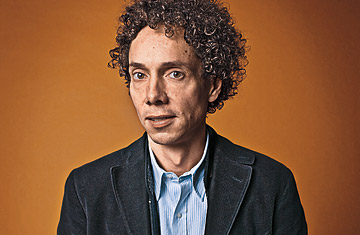
Malcolm Gladwell
(2 of 2)
After all, it's not as if Gladwell is a genius in any measurable sense. In spite of his patrimony, he had no particular gift for math. He entered college two years early but got lousy grades. ("College was not an ... intellectually fruitful time for me," he says, with the air of a man euphemizing strenuously.) He was fired from his first job in journalism, at the American Spectator. It wasn't until he wound up at the Washington Post that he really bore down and learned his craft. "I was a basket case at the beginning, and I felt like an expert at the end," he says. "It took 10 years — exactly that long." There you have it: the 10,000-Hour Rule in action.
According to Outliers, genius isn't the only or even the most important thing. Gladwell's weapon of choice when assaulting myths is the anecdote, and one of the book's most striking, and saddest, is the strange story of Christopher Langan, a man who despite an IQ of 195 (Einstein's was 150) wound up working on a horse farm in rural Missouri. Why isn't he a nuclear rocket surgeon? Because of the environment he grew up in: there was no one in Langan's life and nothing in his background that could help him capitalize on his exceptional gifts. "He had to make his way alone," Gladwell writes, "and no one — not rock stars, not professional athletes, not software billionaires, and not even geniuses — ever makes it alone."
You get the feeling that Gladwell feels a little guilty about his success — that on some level he thinks it should be Christopher Langan's face on the opposite page, not his, and the fact that it isn't says something about a world that isn't as meritocratic as it claims to be. You could read Outliers in many ways — as a brief for affirmative action; as a critique of political correctness (some stereotypes, like Asians being good at math, turn out to be true); even as a defense of Big Government. But it also explains why genius isn't enough. It makes geniuses look a bit less special and the rest of us a bit more so. Outliers wasn't intended as autobiography, Gladwell says. "But you could read it as an extended apology for my success." Apology accepted.
